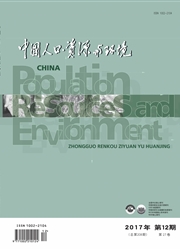

 中文摘要:
中文摘要:
农地整理项目后期管护资金缺失是目前后期管护滞后的主要原因之一,探索农户在农地整理项目后期管护中的出资行为,为解决农地整理项目后期管护资金缺失问题提供借鉴。交易效用理论被广泛用于不同领域解释消费者购买和投资行为。但将交易效用理论用来解释消费者对准公共物品投资行为的相关报道比较罕见。本文基于行为经济学的“交易效用理论”提出农户对农地整理项目后期管护出资行为的假说。并以湖北省部分县市342份农户问卷为样本,采用多元线性回归模型,分析了农户出资行为的影响因素。得到如下研究结果:农户对农地整理项目后期管护的出资额受到农地整理项目后期管护资金差额部分是否需要农户集资、农户对农地整理项目后期管护工作的了解程度等因素显著的正影响,受到农户对农地整理项目工程质量的满意度、户主受教育程度等因素显著的负影响。家庭总收入和农业收入占家庭总收入的比例等因素对农户出资额也产生正向影响.而农地整理项目后期管护资金差额部分是否需要政府补贴对农户出资额产生负向影响。研究结论如下:①投资主体多元化是解决农地整理项目后期管护资金匮乏的真正出路。政府和农户都应是农地整理项目后期管护的出资主体;②交易效用的感知是农户对农地整理项目后期管护出资的重要原因,合理确定政府和农户的出资配比有利于农户感知交易效用;③农业长期增产增效是农户对农地整理项目后期管护出资的内在动机.着眼于现代农业发展的农地整理项目有利于激发广大农民对农地整理项目后期管护的出资热情;④对农地整理的认知是农民对农地整理项目后期管护出资的重要前提。加强有关农地整理政策和农地整理项目的宣传力度,有利于提高农户的认知度;⑤提高农地?
 英文摘要:
英文摘要:
Insufficient fund is one of the main problems which cause the lack of the final management and maintenance in farmland consolidation project. The purpose of this study is to explore farmers' investment behavior of the final management and maintenance in farmland consolidation project, which has great importance to provide reference for solving the problem of insufficient funds. Transaction utility theory has been widely used in different fields to explain consumers' purchase and investment behavior, but rare in the quasi-public goods. The paper uses transaction utility theory of behavioral economics to put forward hypotheses in farmers' investment behavior of the final management and maintenance in farmland consolidation project, and multivariable linear regression model is used to analyze the impact factors on farmers' investment behavior, supported by the survey data of 342 farmers in Hubei Province. The empirical results show that the factors, including whether the deficiency of the final management and maintenance fund requires farmers' investment, farmers' cognition on farmland consolidation project, family income, and the propotion of agricultural income in family income, have positive impacts on farmers' investment, and the factors including the degree of farmers' satisfaction to farmland consolidation project' s quality, farmers' education level and the deficiency of the final management and whether maintenance fund requires financial subsidy, have negative impacts. Conclusions of the study are as follows: (1) Diversified sources of investment, including government and farmer' s investment, which is the effective way of enhancing the fund. (2) The reason for farmers to invest is the perception of transaction utility. Therefore, the optimization investment proportion of fund sources should be established based on transaction utility theory. (3) The intrinsic motivation for farmers to invest is increasing production and improving efficiency of long-term agricultural indus
 同期刊论文项目
同期刊论文项目
 同项目期刊论文
同项目期刊论文
 期刊信息
期刊信息
